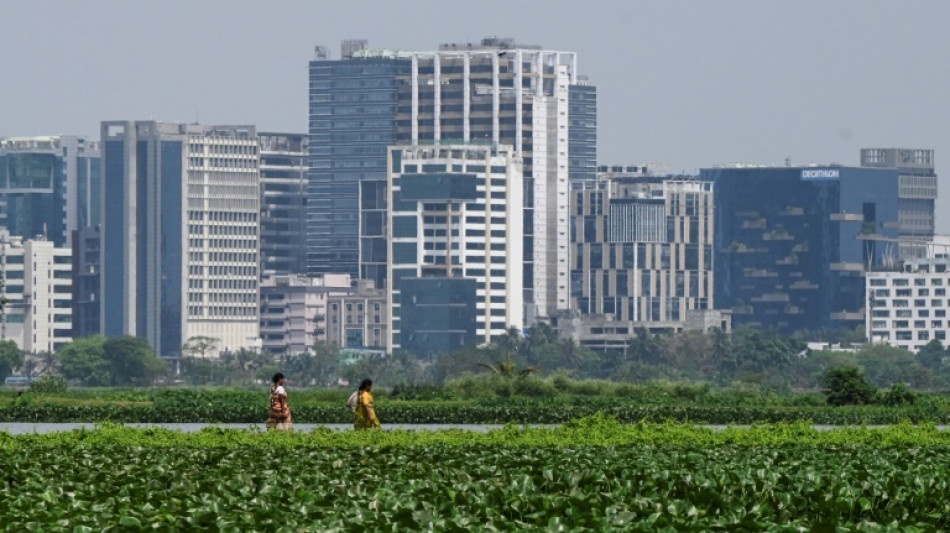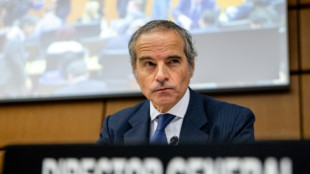
-
 Gold, silver prices tumble as investors soothed by Trump Fed pick
Gold, silver prices tumble as investors soothed by Trump Fed pick
-
Ko, Woad share lead at LPGA season opener

-
 US Senate votes on funding deal - but shutdown still imminent
US Senate votes on funding deal - but shutdown still imminent
-
US charges prominent journalist after Minneapolis protest coverage

-
 Trump expects Iran to seek deal to avoid US strikes
Trump expects Iran to seek deal to avoid US strikes
-
Guterres warns UN risks 'imminent financial collapse'

-
 NASA delays Moon mission over frigid weather
NASA delays Moon mission over frigid weather
-
First competitors settle into Milan's Olympic village

-
 Fela Kuti: first African to get Grammys Lifetime Achievement Award
Fela Kuti: first African to get Grammys Lifetime Achievement Award
-
'Schitt's Creek' star Catherine O'Hara dead at 71

-
 Curran hat-trick seals 11 run DLS win for England over Sri Lanka
Curran hat-trick seals 11 run DLS win for England over Sri Lanka
-
Cubans queue for fuel as Trump issues energy ultimatum

-
 France rescues over 6,000 UK-bound Channel migrants in 2025
France rescues over 6,000 UK-bound Channel migrants in 2025
-
Surprise appointment Riera named Frankfurt coach

-
 Maersk to take over Panama Canal port operations from HK firm
Maersk to take over Panama Canal port operations from HK firm
-
US arrests prominent journalist after Minneapolis protest coverage

-
 Analysts say Kevin Warsh a safe choice for US Fed chair
Analysts say Kevin Warsh a safe choice for US Fed chair
-
Trump predicts Iran will seek deal to avoid US strikes

-
 US oil giants say it's early days on potential Venezuela boom
US oil giants say it's early days on potential Venezuela boom
-
Fela Kuti to be first African to get Grammys Lifetime Achievement Award

-
 Trump says Iran wants deal, US 'armada' larger than in Venezuela raid
Trump says Iran wants deal, US 'armada' larger than in Venezuela raid
-
US Justice Dept releases new batch of documents, images, videos from Epstein files

-
 Four memorable showdowns between Alcaraz and Djokovic
Four memorable showdowns between Alcaraz and Djokovic
-
Russian figure skating prodigy Valieva set for comeback -- but not at Olympics

-
 Barcelona midfielder Lopez agrees contract extension
Barcelona midfielder Lopez agrees contract extension
-
Djokovic says 'keep writing me off' after beating Sinner in late-nighter

-
 US Justice Dept releasing new batch of Epstein files
US Justice Dept releasing new batch of Epstein files
-
South Africa and Israel expel envoys in deepening feud

-
 French eyewear maker in spotlight after presidential showing
French eyewear maker in spotlight after presidential showing
-
Olympic dream 'not over', Vonn says after crash

-
 Brazil's Lula discharged after cataract surgery
Brazil's Lula discharged after cataract surgery
-
US Senate races to limit shutdown fallout as Trump-backed deal stalls

-
 'He probably would've survived': Iran targeting hospitals in crackdown
'He probably would've survived': Iran targeting hospitals in crackdown
-
Djokovic stuns Sinner to set up Australian Open final with Alcaraz

-
 Mateta omitted from Palace squad to face Forest
Mateta omitted from Palace squad to face Forest
-
Djokovic 'pushed to the limit' in stunning late-night Sinner upset

-
 Tunisia's famed blue-and-white village threatened after record rains
Tunisia's famed blue-and-white village threatened after record rains
-
Top EU official voices 'shock' at Minneapolis violence

-
 Kremlin says agreed to halt strikes on Kyiv until Sunday
Kremlin says agreed to halt strikes on Kyiv until Sunday
-
Carrick calls for calm after flying start to Man Utd reign

-
 Djokovic to meet Alcaraz in Melbourne final after five-set marathon
Djokovic to meet Alcaraz in Melbourne final after five-set marathon
-
Italian officials to testify in trial over deadly migrant shipwreck

-
 Iran says defence capabilities 'never' up for negotiation
Iran says defence capabilities 'never' up for negotiation
-
UN appeals for more support for flood-hit Mozambicans

-
 Lijnders urges Man City to pile pressure on Arsenal in title race
Lijnders urges Man City to pile pressure on Arsenal in title race
-
Fulham sign Man City winger Oscar Bobb

-
 Strasbourg's Argentine striker Panichelli sets sights on PSG, World Cup
Strasbourg's Argentine striker Panichelli sets sights on PSG, World Cup
-
Jesus 'made love': Colombian president irks Christians with steamy claim

-
 IAEA board meets over Ukraine nuclear safety concerns
IAEA board meets over Ukraine nuclear safety concerns
-
Eurozone growth beats 2025 forecasts despite Trump woes


The 'kidneys of Kolkata': Indian wetlands under threat
Wetlands just outside India's Kolkata have for generations provided tonnes of food daily and thousands of jobs as they filter sewage through fish ponds -- but rapid urbanisation is threatening the ecosystem.
Conservationists warn that pollution and strong-arm land grabs are putting a lifeline for the megacity's 14 million residents at risk.
"We are destroying the environment," said Tapan Kumar Mondal, who has spent his life farming fish in the ingenious system of canals and ponds stretching across about 125 square kilometres (48 square miles).
"The population... has increased, there is a pressure on nature, they are ruining it," 71-year-old Mondal added.
Listed as a wetland of global importance under the United Nations Ramsar convention, the waters offer natural climate control by cooling sweltering temperatures -- and act as valuable flood defences for low-lying Kolkata.
But Dhruba Das Gupta, from the environmental group SCOPE, said that short-sighted building development was encroaching on the wetlands.
"The wetlands are shrinking," said the researcher, who is trying to finance a study of what is left of the waters.
- 'Ecologically-subsidised city' -
Every day, 910 million litres of nutrient-rich sewage flow into the wetland, feeding a network of about 250 hyacinth-covered ponds.
"Sunlight and the sewage create a massive plankton boom," said K. Balamurugan, chief environment officer for West Bengal state, explaining that the microorganisms in the shallow fish ponds feed rapidly growing carp and tilapia.
Once the fish have had their fill, the water runoff irrigates surrounding rice paddies and the remaining organic waste fertilises vegetable fields.
"The sewage of the city is being naturally treated by the wetlands," Balamurugan said, giving them the nickname the "kidneys of Kolkata".
The community-developed system was created by "the world's foremost connoisseurs of wastewater wise use and conservation", according to its UN Ramsar listing, which also warns it is under "intense encroachment stress of urban expansion".
The late ecologist Dhrubajyoti Ghosh, who played a key role in the 2002 Ramsar submission, called Kolkata an "ecologically-subsidised city".
The wetlands system processes about 60 percent of Kolkata's sewage free of charge, saving the city over $64 million a year, according to a 2017 University of Calcutta study.
Farms in the wetlands provide about 150 tonnes of vegetables daily, 10,500 tonnes of fish annually and employ tens of thousands of people, the Ramsar listing estimates.
For Kolkata, on the vast delta where the Ganges River meets the Indian Ocean, the wetlands also provide flood defences for a city facing rising sea levels due to climate change.
"This city never faced any flooding issue," Balamurugan added. "These wetlands are acting as a natural sponge, taking the excess rainwater."
Das Gupta said the biodiversity hotspot also "plays a very important role in stabilising the climate", calling the wetlands "the lifeline of Kolkata".
"The wetlands have to stay, because of the cooling that they achieve by their very presence," she said.
- 'Land is being snatched' -
But the Ramsar listing notes that industrial effluent is tainting natural systems, threatening food production.
Fish farmer Sujit Mondal, 41, said that compared to last year "production has reduced" because of "murky water".
About 95 percent of the wetlands are in private hands.
As land prices surge, environment officials say they have pleaded with people not to fill in the fish ponds to create new building space.
"We asked them not to convert the wetlands, not to trade these wetlands to buildings, not to get them filled," Balamurugan said.
But residents say village councils are being bribed by land-hungry developers.
"They are often accused by residents of giving informal permission in return for money to real estate developers to build, while they look the other way," said Das Gupta.
"This leads to huge loss of productive space, and destroys the ecosystem services offered by these wetlands," she added.
"The land is being snatched from people," said Sujit Mondal, the fish farmer.
Gangs even net the ponds at night to steal the fish, leaving farmers with little option but to close and sell.
"They pressurise fishermen to give up their livelihoods," said Das Gupta. "Then they take control of the land."
P.Anderson--BTB




